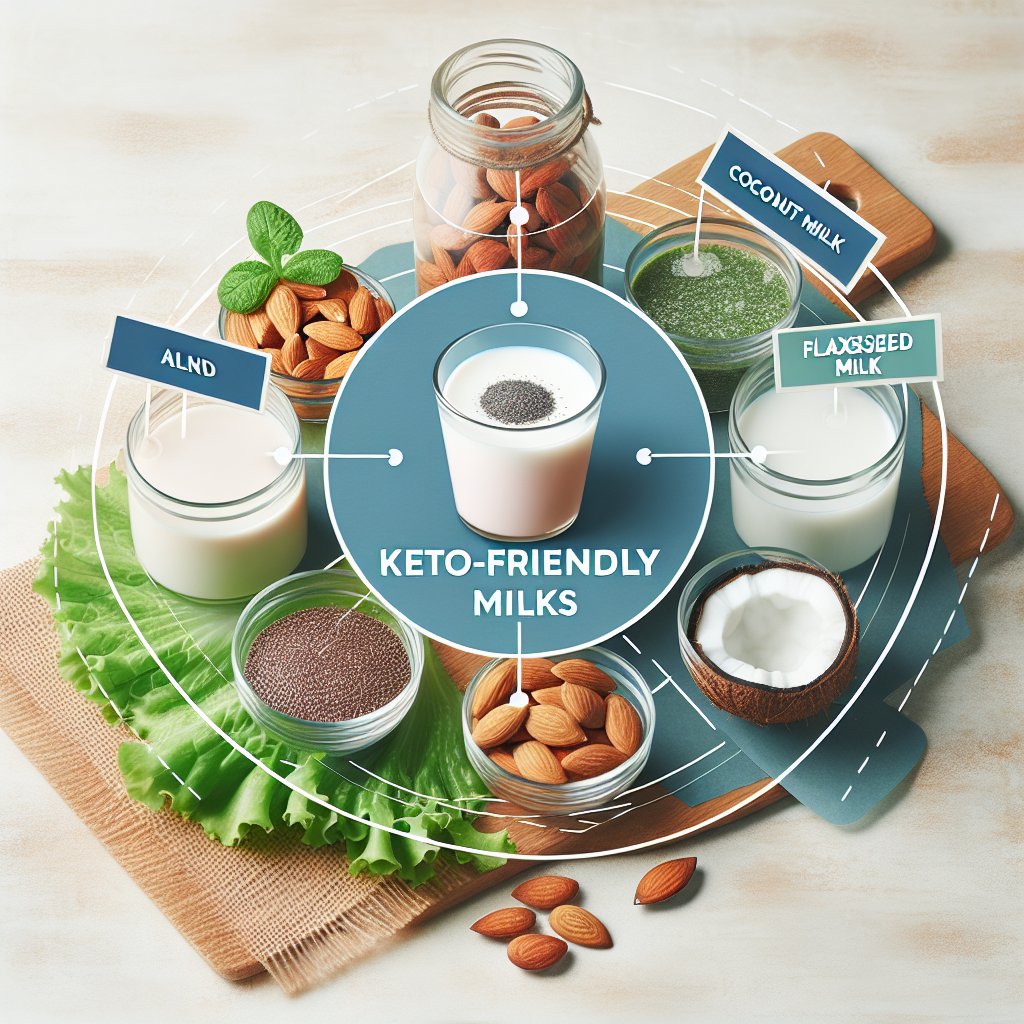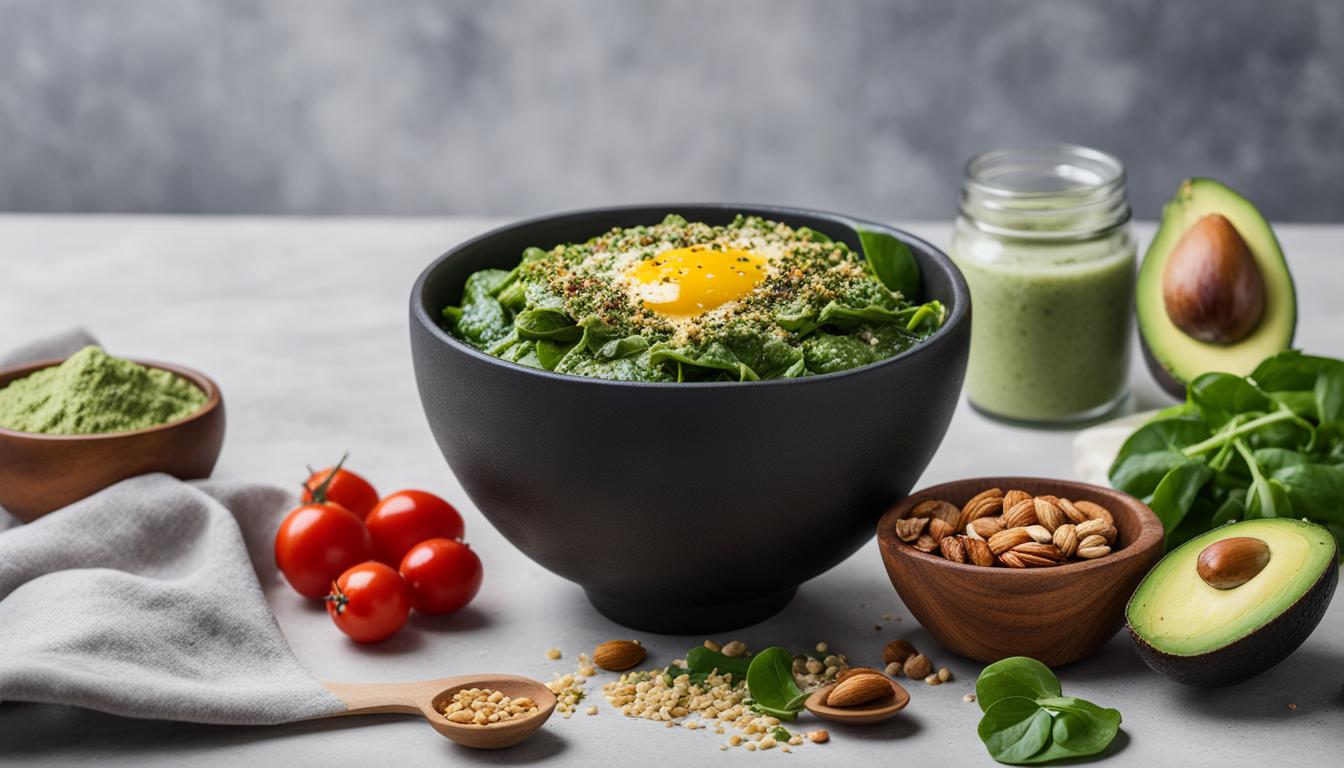Unleash the Power of Keto-Friendly Milks: Your Guide to Low-Carb, High-Fat Goodness!
Unleash the Power of Keto-Friendly Milks: Your Guide to Low-Carb, High-Fat Goodness!
Welcome to the exciting world of ketogenic living, where low-carb, high-fat foods take center stage. The ketogenic diet, known as keto for short, is a trending lifestyle that has captured the hearts of many health enthusiasts around the globe. It’s not just about shedding those stubborn pounds; it’s also about embracing a healthier and more energetic way of life. One of the key components of the keto diet is the focus on incorporating low-carb, high-fat foods into everyday meals. This not only helps in achieving ketosis—a metabolic state where the body burns fat for fuel instead of carbs—but also promotes satiety and improved brain function.
Now, let’s delve into the intriguing and delicious world of keto-friendly milks. These dairy alternatives have gained popularity among those following a ketogenic lifestyle due to their low-carb, high-fat composition, making them a fantastic addition to your daily nutritional intake. In this comprehensive guide, we will explore the various options, benefits, and tips for integrating these creamy and nutrient-rich beverages into your keto journey, ensuring you don’t miss out on the goodness that keto-friendly milks have to offer.

Types of Keto-Friendly Milks
When it comes to the ketogenic diet, choosing the right milk can make a significant difference in maintaining ketosis while still enjoying your favorite creamy beverages. Let’s explore some popular keto-friendly milk options and their nutritional benefits.
Almond Milk
Almond milk is a widely embraced dairy-free, keto-friendly alternative. It’s low in carbs and high in healthy fats, making it an excellent choice for the ketogenic lifestyle. Almond milk contains only 1-2 grams of net carbs per serving, which fits perfectly within the keto macronutrient ratios.
Additionally, almond milk is a good source of vitamin E, which is an essential antioxidant for skin health and immune function. It’s also fortified with calcium and vitamin D, crucial for maintaining strong bones and teeth.
Coconut Milk
Coconut milk is another fantastic option for those following a keto diet. It’s rich, creamy, and has a subtly sweet flavor, making it a delicious addition to both sweet and savory keto recipes. With less than 1 gram of net carbs per serving, coconut milk is a go-to choice for keeping your carb intake low.
Moreover, coconut milk contains medium-chain triglycerides (MCTs), a type of fat that can be easily converted into ketones, providing a quick and efficient energy source for those in ketosis.
Flaxseed Milk
Flaxseed milk is a lesser-known keto-friendly milk alternative that deserves a spot in your pantry. It has a creamy texture and a nutty flavor, making it a versatile option for various keto recipes. With just 1-2 grams of net carbs per serving, flaxseed milk can be a part of your low-carb lifestyle.
Notably, flaxseed milk is packed with omega-3 fatty acids, which are beneficial for heart health and inflammation reduction. It’s also a good source of plant-based protein and fiber, which can aid in satiety and digestive health, both of which are essential components of the ketogenic diet.
Each of these keto-friendly milk options offers unique nutritional benefits while aligning with the low-carb, high-fat principles of the ketogenic diet. Incorporating these milks into your keto meal plans can provide variety and contribute to the overall success of your keto journey.
Benefits of Keto-Friendly Milks
When it comes to following a ketogenic diet, the type of milk you use can make a significant impact on your carb and fat intake. Keto-friendly milks, such as almond milk, coconut milk, and macadamia nut milk, offer several benefits that make them ideal for a low-carb, high-fat lifestyle.
Low-Carb Content
One of the primary benefits of keto-friendly milks is their low-carb content. Unlike cow’s milk, which contains around 12 grams of carbohydrates per cup, unsweetened almond milk has as little as 1 gram of carbs per cup, making it an excellent choice for those looking to minimize carb consumption while enjoying a creamy, flavorful addition to their diet.
Similarly, coconut milk contains about 3 grams of carbs per cup, and macadamia nut milk contains just 1 gram of carbs per cup, making them both fantastic options for individuals following a ketogenic lifestyle.
High-Fat Content
Another advantage of incorporating keto-friendly milks into a ketogenic diet is their high-fat content. In a keto diet, a significant portion of daily calories comes from healthy fats. Almond milk, coconut milk, and macadamia nut milk are all rich in good fats, particularly MCTs (medium-chain triglycerides), which are easily converted into ketones, the primary fuel source for the body on a ketogenic diet.
These healthy fats not only support ketosis but also help with the absorption of fat-soluble vitamins A, D, E, and K, making keto-friendly milks a nutritionally dense choice for individuals on a ketogenic diet.
Potential Health Advantages
Besides their low-carb and high-fat content, keto-friendly milks offer potential health advantages. For example, almond milk is a great source of vitamin E, which acts as an antioxidant in the body, protecting cells from damage. Coconut milk contains lauric acid, known for its antimicrobial and antiviral properties, potentially supporting immune health. Macadamia nut milk is a good source of monounsaturated fats, which are heart-healthy fats that may help improve cholesterol levels.
By incorporating these nutrient-rich, keto-friendly milks into your ketogenic diet, you can enjoy not only their delicious flavors but also their potential health benefits, making them a valuable addition to your low-carb, high-fat lifestyle.

How to Choose the Best Keto-Friendly Milk
Hey there, keto enthusiasts! Are you on the lookout for the perfect keto-friendly milk but feeling a bit overwhelmed by the options? Fear not, as I’m here to guide you through the process of selecting the ideal milk that aligns with your personal preferences, dietary restrictions, and nutritional goals.
Personal Preferences
When it comes to personal preferences, the journey to finding the best keto-friendly milk can be quite unique. Some may prefer the creaminess of certain milk alternatives, while others may be looking for a neutral taste to use in various recipes.
Consider the following:
– Do you enjoy the rich flavor of coconut milk?
– Are you looking for a milk substitute that seamlessly blends into your morning coffee?
– Do you prefer the mild taste of almond milk?
These questions can help narrow down your options and lead you to a keto-friendly milk that suits your taste buds perfectly.
Dietary Restrictions
If you have dietary restrictions, such as lactose intolerance or nut allergies, it’s essential to consider milk alternatives that cater to your specific needs. The good news is that there are numerous keto-friendly milk options available to accommodate various dietary restrictions.
Here are a few to consider:
– Unsweetened coconut milk: A creamy and versatile option for those with nut allergies or lactose intolerance.
– Macadamia nut milk: A rich and smooth choice for individuals seeking a low-carb, nut-based milk.
– Hemp milk: A nut-free, dairy-free alternative packed with omega-3 fatty acids and suitable for vegans.
By carefully reviewing the ingredients and potential allergens, you can confidently select a keto-friendly milk that aligns with your dietary restrictions.
Nutritional Goals
When selecting a keto-friendly milk, it’s crucial to consider your nutritional goals. For many individuals following a ketogenic diet, the primary focus is on low-carbohydrate, high-fat options that support ketosis.
Key nutritional factors to look for:
– Low net carbs: Aim for milk options with minimal added sugars and carbohydrates.
– High fat content: Seek out milk alternatives with a higher fat content to support ketosis and satiety.
– Fortified options: Some keto-friendly milks are fortified with essential nutrients like calcium and vitamin D, which can contribute to overall nutritional intake.
By prioritizing these nutritional goals, you can make an informed choice that complements your keto lifestyle.
Reading Labels for Hidden Sugars
When venturing into the realm of keto-friendly milks, it’s essential to become a pro at reading labels to uncover any hidden sugars. Many seemingly healthy milk alternatives may contain added sugars, which can quickly derail your ketosis efforts.
Keep an eye out for the following:
– Added sweeteners: Ingredients like cane sugar, agave syrup, or evaporated cane juice can increase the sugar content.
– Carbohydrate count: Pay attention to the total carbohydrates and subtract fiber and sugar alcohols to calculate the net carbs.
By diligently scanning the nutrition labels and ingredients list, you can confidently select a keto-friendly milk that is free from hidden sugars and aligns with your low-carb lifestyle.
So, armed with these tips, you’re well-equipped to navigate the sea of keto-friendly milk options and find the perfect match for your personal preferences, dietary restrictions, and nutritional goals. Happy milking, and cheers to embracing the low-carb, high-fat goodness of keto-friendly milks!
Recipes Using Keto-Friendly Milks
Hey there, keto enthusiasts! If you’re looking to add some creamy and nutritious flair to your low-carb, high-fat repertoire, you’ve come to the right place. Keto-friendly milks are a fantastic way to level up your keto cooking and baking game. They are packed with healthy fats and are low in carbs, making them the perfect ingredient for a wide variety of drinks, smoothies, desserts, and savory dishes. Let’s dive into some delicious recipes that showcase the versatility of keto-friendly milks.
Creamy Avocado Smoothie
Creamy, dreamy, and oh-so-fulfilling, this avocado smoothie is a keto favorite that you’ll want to whip up again and again.
Ingredients:
– 1 ripe avocado
– 1 cup unsweetened almond milk
– 1 tablespoon coconut oil
– 1 tablespoon chia seeds
– 1 teaspoon vanilla extract
– 1-2 tablespoons keto-friendly sweetener
– Handful of ice
Instructions:
1. In a blender, combine the avocado, almond milk, coconut oil, chia seeds, vanilla extract, and sweetener.
2. Blend until smooth and creamy.
3. Add ice and blend again until well combined.
4. Pour into a glass, top with a sprinkle of chia seeds if desired, and enjoy!
Keto-Friendly Milk and Berries Chia Pudding
This chia pudding is a delightful way to savor the goodness of keto-friendly milks while satisfying those berry cravings.
Ingredients:
– 1 cup unsweetened coconut milk
– 3 tablespoons chia seeds
– 1 tablespoon keto-friendly sweetener
– 1/2 teaspoon vanilla extract
– Mixed berries for topping
Instructions:
1. In a bowl, mix together the coconut milk, chia seeds, sweetener, and vanilla extract.
2. Let the mixture sit for 5-10 minutes, then stir again to prevent clumping.
3. Cover the bowl and refrigerate for at least 2 hours or overnight.
4. Once the chia pudding has set, top with a generous serving of mixed berries and enjoy!
Creamy Keto Alfredo Sauce
Indulge in the rich, indulgent flavors of an Alfredo sauce while keeping it keto with the magic of keto-friendly milks.
Ingredients:
– 1 cup unsweetened heavy cream
– 1/2 cup grated parmesan cheese
– 2 tablespoons unsalted butter
– 2 cloves garlic, minced
– Salt and pepper to taste
– A pinch of nutmeg (optional)
Instructions:
1. In a saucepan, melt the butter over medium heat.
2. Add the minced garlic and sauté until fragrant.
3. Pour in the heavy cream and let it simmer gently.
4. Stir in the grated parmesan cheese and continue to cook until the sauce thickens.
5. Season with salt, pepper, and a pinch of nutmeg, if using.
6. Serve over zucchini noodles or your favorite keto-friendly pasta substitute.
By incorporating keto-friendly milks into your recipes, you’re not just enhancing the taste and texture, but also boosting your intake of essential nutrients and healthy fats. So, go ahead and give these recipes a try to experience the keto goodness for yourself!

Tips for Incorporating Keto-Friendly Milks into Daily Routine
So, you’ve made the decision to embrace the ketogenic lifestyle. You’re swapping out your regular milk for keto-friendly milks, but now the question is: how do you incorporate them seamlessly into your daily routine?
Start with Your Morning Coffee
If you’re a coffee drinker, incorporating keto-friendly milks into your morning routine is a fantastic way to start your day on a low-carb note. Whether you prefer almond milk, coconut milk, or macadamia nut milk, these dairy alternatives can be the perfect addition to your coffee. Experiment with different varieties to find the one that suits your taste buds best.
Make Creamy Keto-Friendly Smoothies
Smoothies are a popular choice for a quick and easy breakfast or a refreshing snack. To make them keto-friendly, use unsweetened almond milk or coconut milk as the base. Add in some low-carb fruits like berries or avocado, a handful of leafy greens, and a scoop of MCT oil or nut butter for a creamy, satisfying, and keto-approved treat.
Enhance Your Cooking and Baking
Keto-friendly milks are incredibly versatile and can be used in a variety of cooking and baking recipes. When a recipe calls for regular milk, simply swap it out with almond milk, coconut milk, or macadamia nut milk. Use them to make creamy sauces, decadent desserts, and moist, tender baked goods without worrying about the carb content.
Upgrade Your Overnight Oats
Overnight oats are a convenient and delicious breakfast option, and they can easily be made keto-friendly. Instead of using regular milk, soak your oats in almond milk or coconut milk. Add in some chia seeds, a dash of vanilla extract, and a natural low-carb sweetener like stevia or erythritol. Top it off with some nuts or seeds for a perfect grab-and-go keto breakfast.
By incorporating keto-friendly milks into your daily meals and snacks, you can enjoy the creamy, satisfying goodness without compromising your low-carb lifestyle. Whether in your coffee, smoothies, cooking, baking, or breakfast bowls, these dairy alternatives are a game-changer for anyone on the ketogenic diet.
Addressing Potential Risks and Considerations of Keto-Friendly Milks
When it comes to embracing the keto lifestyle, incorporating keto-friendly milks into your diet can be a game-changer. However, as with any dietary change, it’s essential to be aware of potential risks and considerations associated with consuming these alternatives to traditional cow’s milk.
Allergies and Sensitivities
Keto-friendly milks such as almond, coconut, and cashew milks are incredibly popular among those following a low-carb, high-fat diet. However, it’s important to note that these milk alternatives are derived from nuts and coconuts, which are common allergens. Individuals with nut or coconut allergies should exercise caution and consider alternative options such as macadamia milk or hemp milk.
Additives and Processing Methods
Another consideration when consuming keto-friendly milks is the presence of additives and the processing methods used in their production. Some commercially available nut and coconut milks may contain added sugars, thickeners, and preservatives, which can contribute to hidden carbohydrates and negatively impact ketosis.
To mitigate this risk, it’s crucial to carefully read product labels and opt for unsweetened, additive-free varieties. Better yet, consider making your own keto-friendly milk at home using minimal ingredients to ensure full control over the quality and purity of the product.
Moderation and Variety
While keto-friendly milks can be a valuable addition to a ketogenic diet, it’s important to consume them in moderation and incorporate a variety of options to reap their benefits while minimizing potential risks. This approach not only helps in diversifying nutrient intake but also reduces the likelihood of developing sensitivities or intolerances to a single type of keto-friendly milk.
Opt for rotating between almond, coconut, macadamia, and hemp milks to ensure you’re getting a spectrum of nutrients and reducing the potential for overexposure to any single allergen or anti-nutrient present in a particular type of milk.
In conclusion, keto-friendly milks are a fantastic way to elevate your keto journey, but it’s crucial to navigate potential risks and considerations by being mindful of allergies, opting for minimally processed options, and practicing moderation and variety in consumption. By doing so, you can savor the low-carb, high-fat goodness of keto-friendly milks while prioritizing your overall well-being on the ketogenic diet.


